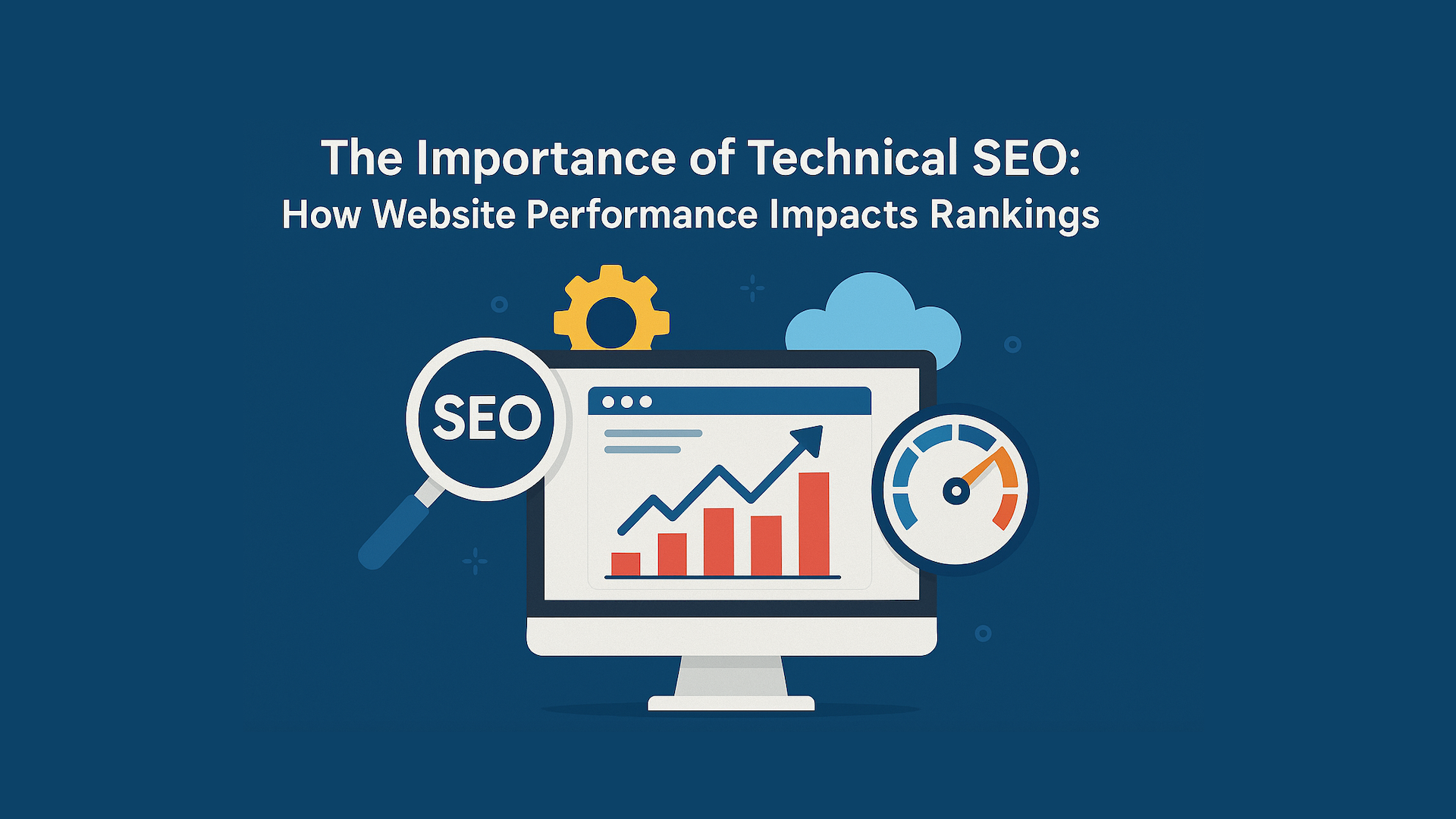
The Importance of Technical SEO: How Website Performance Impacts Rankings
When people talk about SEO, most think about keywords and content. But here’s the real truth: your website’s technical performance is just as important as your content. If your site loads slowly, is hard to crawl, or is confusing for search engines, you will struggle to rank — even with great content. This is where technical SEO becomes essential.
In this guide, you’ll learn why technical SEO matters, how website performance impacts rankings, and the steps you can take to improve your site.
What Is Technical SEO?
Technical SEO refers to improving the “behind-the-scenes” parts of your website so search engines can crawl it, understand it, and index it easily. It also ensures that users get a fast and smooth experience.
Technical SEO makes your website easy for Google and users to use.
This includes:
- Page speed
- Mobile friendliness
- Secure browsing (HTTPS)
- Clear site structure
- Crawlability
- Indexing
- Fixing errors
- Optimizing Core Web Vitals
- Removing duplicate content
- Adding structured data
These steps help search engines understand what your pages are about and help users enjoy the website without frustration.
Why Website Performance Matters for Rankings
Search engines want to send users to websites that load fast, are easy to use, and offer a smooth experience. If your site is slow or broken, users leave fast — and Google notices.
Here’s how performance affects rankings:
1. Slow Websites Increase Bounce Rate
When a website takes too long to load, people leave. A high bounce rate signals to Google that users don’t like the page.
2. Speed Is a Ranking Factor
Google uses Core Web Vitals to measure speed and page experience. Sites that score well usually rank better.
3. Mobile Performance Impacts Visibility
Google uses mobile-first indexing, meaning your mobile site is the version used for ranking. Slow mobile pages hurt SEO.
4. Better Performance Improves User Experience
Fast, clean websites keep users on the page longer. More engagement means better rankings.
5. Good Technical Setup Helps Crawling
If Google cannot crawl or index your pages properly, they simply won’t rank.
Table: How Technical SEO Issues Affect Rankings
Key Technical SEO Factors That Impact Rankings
Below are the most important elements of technical SEO that directly affect your website performance and rankings.
1. Page Speed Optimization
Fast websites create a better user experience and are more likely to rank higher. A slow site frustrates users and increases drop-offs.
Improve speed by:
- Compressing images
- Enabling browser caching
- Using a lightweight theme
- Reducing unused scripts
- Using a CDN (Content Delivery Network)
- Optimizing Core Web Vitals
2. Mobile-Friendly Website
More than half of web traffic comes from mobile devices. If your site doesn’t work well on mobile, Google will push it down in rankings.
Make sure your site:
- Uses responsive design
- Has readable text
- Loads quickly on mobile
- Has clickable elements spaced correctly
3. Secure Website (HTTPS)
Google has confirmed that HTTPS is a ranking factor. Without it, users see a “Not Secure” warning, which reduces trust and clicks.
Switching to HTTPS improves:
- Security
- User trust
- Search engine ranking
4. Crawlability and Indexing
Search engines must be able to access and index your pages. Technical SEO ensures search engines can crawl your site without hitting errors.
Important elements include:
- XML sitemap
- Robots.txt file
- Fixing crawl errors
- Using proper redirects
- Avoiding blocking important pages
5. Site Structure and Internal Linking
A clear site structure helps Google understand your content and boosts your overall SEO strength.
Good structure means:
- Easy navigation
- Proper categories
- Logical URL structure
- Strong internal linking
- No orphan pages
Structured websites rank higher because Google can easily follow and understand them.
6. Core Web Vitals
Core Web Vitals are Google’s way of measuring real-world user experience.
They include:
- Largest Contentful Paint (LCP) – loading performance
- First Input Delay (FID) – interactivity
- Cumulative Layout Shift (CLS) – visual stability
Improving these scores can lead to better rankings and happier users.
7. Structured Data (Schema Markup)
Structured data helps Google understand your content and show rich results such as:
- FAQs
- Recipes
- Events
- Reviews
- Product details
Rich results can increase your click-through rate and visibility.
Technical SEO Checklist for Better Performance
Here is a simple but effective checklist:
- Ensure website loads under 2.5 seconds
- Fix all broken links
- Use HTTPS
- Add an XML sitemap
- Optimize for mobile
- Minify CSS and JS
- Remove duplicate pages
- Add structured data
- Submit your site to Google Search Console
- Fix crawl errors regularly
- Improve Core Web Vitals
- Use clean URL structure
This checklist helps both search engines and users.
How to Measure and Maintain Technical SEO
Technical SEO is not a one-time task — it requires regular monitoring.
Use tools like:
- Google Search Console
- Google PageSpeed Insights
- Google Lighthouse
- Screaming Frog
- GTmetrix
- Ahrefs Site Audit
Run a technical audit at least once every quarter to fix issues before they affect rankings.
Frequently Asked Questions
What is the difference between technical SEO and on-page SEO?
Technical SEO focuses on performance and crawlability. On-page SEO focuses on keywords and content.
How often should I audit my website?
A technical SEO audit every 3 months is ideal.
Does website speed really affect ranking?
Yes. Slow pages have higher bounce rates and lower search visibility.
Do I need coding skills for technical SEO?
Not always. Many tasks can be done using plugins, tools, or a developer’s help.
How fast should my website load?
Aim for under 2.5 seconds for best results.
Conclusion
Technical SEO ensures that your website is fast, secure, and easy for search engines to read. When your site performs well, users stay longer, bounce rates drop, and search engines reward you with better rankings. Without strong technical SEO, even the best content may never reach its full potential.
If you want your website to rank higher and perform better, start fixing technical issues today.
If you want expert help improving your website speed, fixing technical issues, or boosting your search rankings, reach out to us. We will audit your site, fix performance problems, and help you grow with a solid technical SEO contact us now.
Get A Quote
Reach Out and Bring Your Visions to Life
Get A Quote
Reach Out and Bring Your Visions to Life

